SSU Forum with Professor T.J. Pempel
| Date: | Wednesday, May 7, 2014, 10:30-12:00 |
|---|---|
| Venue: | Seminar Room, 3rd Floor, Ito International Research Center |
| Subject: | How is the Obama "Pivot" Working Out? |
| Lecture: | Professor T.J. Pempel, Jack M. Forcey Professor of Political Science for Study of East Asian Politics, UC Berkeley |
| Language: | English |
| Hosted by: | Security Studies Unit, Policy Alternatives Research Institute, the University of Tokyo |
| Co-hosted by: | The Economy-Security Nexus |
Professor TJ Pempel, Jack M. Forcey Professor of Political Science for Study of East Asian Politics, University of California Berkeley, was the exceptional guest of the SSU Forum taking place on Wednesday, May 7, 2014. He delivered a lecture entitled The US Pivot, Hotspots and Recent Complications.
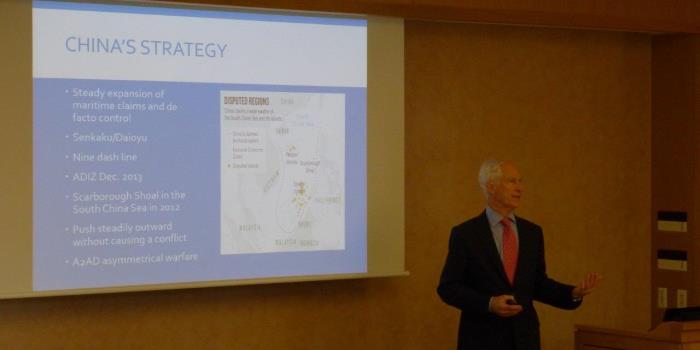
SSU Director Professor Kiichi Fujiwara introduced the speaker as one of the world's leading experts in East Asia security studies, whose work has stimulated and influenced generations of scholars. His contribution to the discipline has been outstanding especially for his comparative study of Japanese politics.
After expressing his gratitude to the host for the invitation, Professor Pempel started his lecture by considering some of the most recent developments in East Asian international politics in the aftermath of President Obama's visit in the region. American and Asian commentators have produced rather different evaluations of the trip. From the US perspective, the diplomatic tour was successful. Firstly because President Obama finally managed to come to this region of the world, after domestic political circumstances had prevented him to do so in the recent past. Secondly, the trip has shown how most US partners in the region are looking for more American involvement in the region, underscoring an unmet demand for US-provided security and simple presence and engagement, and therefore bolstering the underlying positive image of Washington's regional role. The US may actually not be able to provide as much as has been requested from its allies and friends. However, this situation reveals the solidity of US status as global power despite the recurrent narratives of decline. Concerning Japan, the US has reaffirmed its commitment to the defence of Japan's security, but there has been admittedly limited progress concerning TTP negotiations.
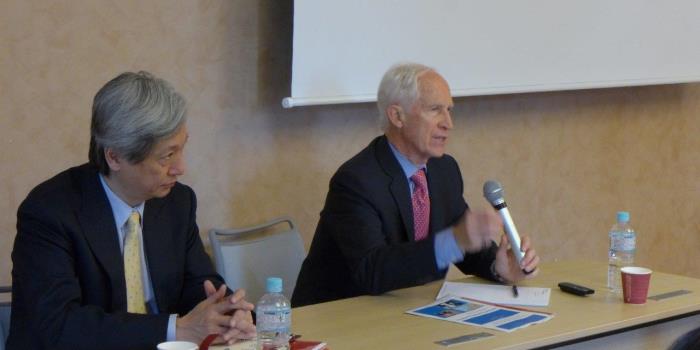
From an Asian perspective, the US President has been criticised in Japan for not taking a tougher stance on China, and being more explicit on sovereignty concerning the Senkaku issue, while in Korea and elsewhere the criticism has focused on the possible misconceptions allegedly affecting US foreign policy concerning Japan's role in the region and the absence of a solution for the peninsula.
Moving to the core of his lecture, Professor Pempel offered a historical reconstruction of the “pivot” to Asia in the context of a long term analysis of US foreign and security policy in this area of the world. In many ways the very concept of pivot is problematic as it seems to suggest that the US can only focus on one macro-region of the world at the time, which is not the case.
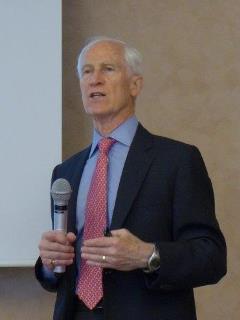
Historically, the US was originally significantly more committed to Europe than to Asia, particularly during the Cold War. Only after the collapse of the communist bloc in 1989-1991, and during the Clinton administration, did a conspicuous shift towards Asia start to materialise. The US, using the APEC (Asia-Pacific Economic Cooperation) forum as the main platform, envisaged the creation of a strong trade link between the US and the East Asian region as one of the pillars of the post-Cold War economic order. This also took advantage of the burgeoning growth that the region has been displaying. Professor Pempel then articulated the view that President G.W. Bush's foreign policy produced considerable damage to vast areas of American interests by fighting unnecessary wars, abandoning the advancement of a multilateralist agenda on a number of important issues (Kyoto Accord, Convention Against Small Arms, Biological Weapons Control, Chemical Weapons Control, International Court of Justice and so on), and pursuing unrealistic goals, largely though military means. The Bush era also meant an almost exclusive focus on the broader Middle East and the consequent loss of top level attention to Asia (and other regions as well). Symmetrically, this US policy triggered a widespread unpopularity if not open resentment among vast audiences worldwide.
With the 2008 turn in US politics and the beginning of a new administration, President Obama has tried to reverse this trend and repair the damage to the US image in the world, and particularly in Asia. In Asia, the new course of foreign policy has translated into a new form of engagement articulated around six lines, namely: “strengthening of bilateral security alliances; deepening cooperation with emerging powers, including China; engaging with regional multilateral institutions; expanding trade and investment; forging a broad-based military presence, and finally advancing democracy and human rights”. The US foreign policy in Asia remains characterised by three key objectives, namely: 1) the preservation of America's long terms interests; 2) the strengthening of existing alliances and partnerships and 3) doing so without alienating China and/or generating “open-ended military rivalry across the region”.
Professor Pempel focused his analysis of the current situation on four major issues. The first one is the unresolved problem represented by the DPRK and the related security threat to the region. After the comprehensive deal reached on Leap Day 2012 has collapsed, there seems to be no clear direction of upcoming developments, but a fourth nuclear test by Pyongyang appears to be likely. The second issue relates to Taiwan. Despite recent protests in Taipei, this front appears quiet at the moment. The third one is the fostering of multilateralism, a policy which the Obama administration has embraced with a series of initiatives aimed at making US presence in multilateral settings more visible and institutionalized.
The fourth issue, namely how to deal with a rising China, is much more complex. On the one hand, there is a profound economic interdependence between China and the US. But while Chinese foreign policy in the 2000-2010 period did not give cause for significant concerns, increasing assertiveness from Beijing after 2010 appears to be very problematic, both with reference to the bilateral relations, to its domino effect in the region, and its repercussions on the US-centred alliance system.
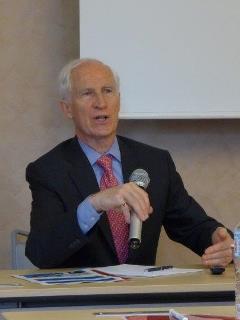
This is particularly noticeable for Japan, whose international influence has not been growing for the last two decades mostly as a consequence of economic stagnation and political instability. Japan seems to desire a more assertive US posture in defence of its geostrategic interests vis-à-vis China, and “fears of abandonment” are on the rise in the Tokyo-Washington alliance. On the other hand though, the US is also dissatisfied with Japan's lack of structural reforms, on the resurgence of nationalism as the prevalent political narrative, and the symbolic gestures that are the consequence of such dominant political culture. Finally, the US appears dissatisfied by the growing mistrust between Japan and Korea.
The US position towards China is difficult to predict due to the number of uncertainties around key aspects of the bilateral relation and of other actors' behavior. China itself is the “big unknown”: it is unclear to what extent it is possible to describe and predict China's foreign policy and to identify its core drivers. While skeptical about recurring narratives of US decline, Professor Pempel highlighted several constraints on possible US military deployment as a consequence of budget cuts affecting ground forces (but not the US Navy). Moreover, because of global American commitments, it is difficult to say whether US resources will not be again diverted away from East Asia in the event of crises unfolding in other regions of the planet. Finally, major factors affecting US foreign policy may originate in the complex domestic political situation, where American voters are indeed privileging economic and/or ideological questions over international political matters.
In conclusion, Professor Pempel suggested that, notwithstanding numerous structural factors acting as constraints or vectors to future trajectories, the role of agency in steering events towards cooperation rather than confrontation should not be underestimated, and that in this view it is important for national leaders and policymakers to work toward creating a positive vision of the future by endeavoring to search for positive gains from non-confrontational interactions.
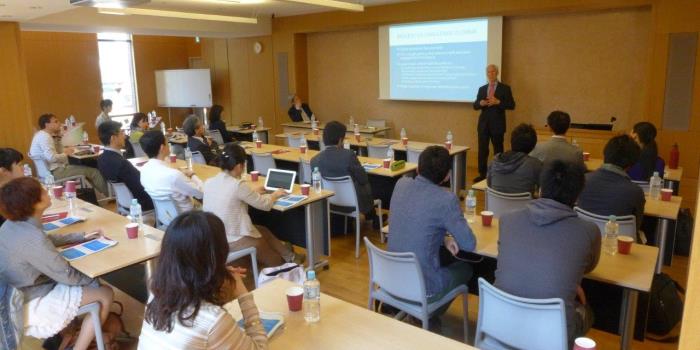
-
Jack M. Forcey Professor of Political Science for Study of East Asian Politics, University of California, Berkeley
